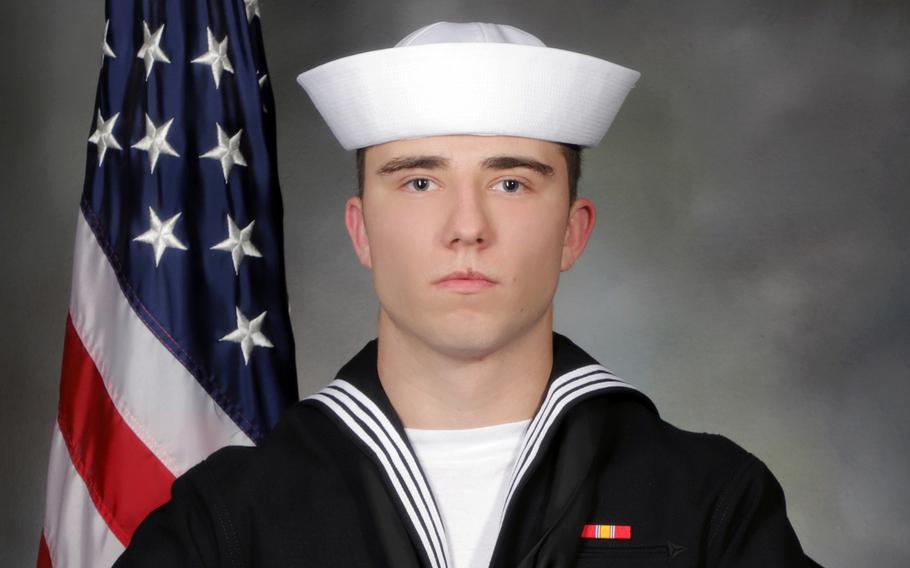
Seaman Recruit David “Dee” Spearman, assigned to the destroyer USS Arleigh Burke, died after going overboard Aug. 1, 2022, while the ship was in the Baltic Sea. His father, Lee Spearman, filed a $7 million wrongful death claim against the Navy on July 26, 2024. (U.S. Navy)
NAPLES, Italy — The father of a Navy sailor who died after falling into the Baltic Sea from a destroyer two years ago has filed a wrongful death claim for $7 million against the service.
Lee Spearman of Huntingdon, Tenn., alleges that medical personnel and officials aboard the USS Arleigh Burke knew that Seaman Recruit David “Dee” Spearman had a history of dangerous fainting spells but did not take adequate measures to protect him.
The 19-year-old sailor, who had been declared fit for duty, was working by himself when he fell into the dark waters of the sea around noon on Aug. 1, 2022.
With that medical history and in the absence of a clear diagnosis, Dee Spearman should not have been allowed to work alone on the ship deck, especially without a personal flotation device, Lee Spearman told Stars and Stripes on Sunday.
“It’s so blatantly negligent that I can’t go to sleep without my son having some type of justice,” he said. “It’s not right.”
Spearman gave a copy of the claim, including an investigation report by U.S. 6th Fleet, to Stars and Stripes. He made it using a Standard Form 95, which is typically used to file for damages against the U.S. under the Federal Tort Claims Act.

Seaman Recruit David “Dee” Spearman, center, with his parents, Nikki and Lee Spearman. Dee Spearman died on Aug. 1, 2022, after falling overboard from the destroyer USS Arleigh Burke into the Baltic Sea. Lee Spearman filed a $7 million wrongful death claim against the Navy on July 26, 2024. (Lee Spearman)
On Tuesday, the Navy declined to say whether it had received Spearman’s claim, which he sent to the Judge Advocate General on Friday. The service said only that it does not comment on individual claims.
A Naval Criminal Investigative Service report found that Dee Spearman had lost consciousness at least four times in the weeks before his death and had repeatedly sought help from Arleigh Burke’s medical staff.
Investigators did not offer a conclusion about what caused the young sailor’s death but seemed to suggest that he may have fainted or slipped while sanding the ship’s forward bulkhead, according to a copy of the report obtained by Stars and Stripes through an information request.
No one saw Dee Spearman fall, and there wasn’t any video, NCIS investigators found.
A Stars and Stripes investigation into Dee Spearman’s death found that while his fainting episodes were well-documented, little was done to keep him safe.
The findings also revealed failures in communication and decision-making and lapses in how the Navy reports and studies man-overboard events.
In his declaration, Lee Spearman points to findings in the 6th Fleet investigation that he says support his assertion of negligence.
For example, an unidentified investigating officer recommended that a policy be created to ensure that “no personnel should be permitted to work alone, unsupervised or without a life vest within three feet of the ship’s lifelines,” the command investigation states.
The recommendation would augment an existing Navy rule requiring sailors to wear life preservers in certain circumstances, including where “the potential exists of falling, slipping, being thrown or carried into the water,” according to the command investigation.
And although Dee Spearman’s divisional chain of command determined that he should be subject to certain restrictions, including being assigned to work with a fellow sailor, there was no written order prohibiting him from working alone, the report states.
Importantly, the command investigation also shows that Dee Spearman’s condition was well-known throughout the ship and that he was worried about his health, Lee Spearman said.
Arleigh Burke medical staffers, who treated Dee Spearman at least three times for losing consciousness, believed that he was dehydrated and may not have been eating enough, the command investigation shows.
But Dee Spearman told his parents and fellow sailors that he was drinking plenty of fluids and believed the fainting episodes were due to a deeper neurological issue.
“ ‘They aren’t taking me serious, but there is something seriously wrong,’ ” Lee Spearman said his son told him about the ship’s medical providers during their last conversation.
Still, the 6th Fleet report found that there wasn’t enough evidence to determine whether safety standards for the use of life preservers, Spearman’s medical condition or other factors were causal or contributing factors in his death.
The report did conclude that Spearman died in the line of duty and not because of any misconduct.
Lee Spearman filed the claim on his own, without the help of a lawyer. He is aware of the 1950 U.S. Supreme Court ruling known as the Feres Doctrine, which prohibits active-duty military personnel from suing the Pentagon for injuries during their service.
Even so, there have been some exceptions, including a 2019 federal law allowing service members to sue the Defense Department for medical malpractice.
“It’s like David and Goliath. I’m going up against a giant,” said Spearman, who is determined to get the Navy to take responsibility for his son’s death.
“It could have been prevented,” Spearman said. “He should not be dead.”